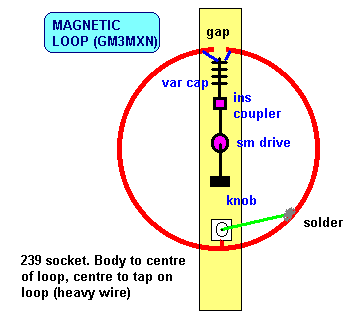

Various articles have appeared describing magnetic loops for HF use, some with complicated methods of remote tuning and the antenna can be quite a useful and interesting project.
The article in Sprat 61 my Tom, GM3MXN describes a loop useable from 7 - 21 mHz, using half inch copper tube 3 feet in circumference. As shown, there is a gap at the top of the loop, which may be about 3/4 inch, either side of which is connected to the tuning capacitor, which can be about 250 pF. The inner of the SO239 socket at the base of the loop is soldered onto the centre of the loop, with the inner forming a gamma match to the tube, about 9 inches from the earthy connection. This is adjusted for minimum SWR. As show, the loop can be mounted on a wooden support and is fed with 50 ohm coax.
Tuning of the capacitor is very critical, and it may be advantageous to use more than one slow motion drive, which is what I did in my version.
It should be noted that a high potential is present across the gap, and even at QRP levels can be dangerous. Certainly with higher powers, this situation can be LETHAL. I would personally not recommend the use of such a loop in the shack because in my opinion even, QRP levels can produce what may be dangerous amounts of RF, which has been blamed for brain damage. Suffice it to say that I know of one local who did use a mag loop indoors and wondered why the paint next to the loop was bubbling (!), and another who used a handheld VHF/UHF handheld, always with the rig next to his head. He died of a brain tumour. Whether there is any medical evidence or not, I think it wise to avoid situations of RF close to the body. Is it worth the risk?
For high power use a wide spaced capacitor is needed to avoid flash over.
Maximum radiation is off the ends of the loop, not broadside on, as in a quad or delta loop.
It will be necessary to retune the variable capacitor when QSYing, even slightly, as this is a high Q system. I used one on 40 meters and it proved fairly directional and quiet.
Other versions have used coax inner instead of copper tube. It is important to ensure that the loop is made from low ohmic material. If a square version is attempted, using say plumbers' connectors, ensure each joint is very well made, electrically.